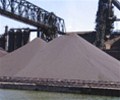Iron ore futures fell on Monday, as traders were worried about weaker-than-expected steel consumption in the peak construction season and possible steel output curbs during winter in top consumer China, and as pre-holiday restocking came to an end.
The most-traded January iron ore on China’s Dalian Commodity Exchange (DCE) ended daytime trading 2.03% lower at 844.5 yuan ($115.55) a metric ton, the weakest since Sept. 11.
The benchmark October iron ore on the Singapore Exchange was down 4.23% at $116.05 a ton, as of 0704 GMT, also the lowest since Sept. 11.
“It becomes increasingly clear that demand has hit the ceiling amid weaker-than-expected steel sales for September and October, and after the replenishment of raw materials to meet production needs over the upcoming week-long holiday break came to an end,” said Pei Hao, a Shanghai-based analyst at international brokerage firm FIS.
China will begin a week-long holiday to celebrate its Mid-Autumn festival and National Day from Sept. 29.
Weighing on the prices of the key steelmaking ingredient were also “concerns of tighter monetary policy”, analysts at ANZ Bank said in a note.
U.S. Federal Reserve officials on Friday flagged further interest rate hikes even after voting to hold the benchmark federal funds rate steady at a meeting last week.
Embattled real estate developer China Evergrande said it was unable to issue new debt due to an investigation into one of its subsidiaries.
Other steelmaking ingredients also receded, with coking coal DJMcv1 and coke DCJcv1 on the DCE down 0.84% and 0.74%, respectively.
The drop in coal prices came despite all coal mines in Panzhou city suspending production for a day, according to consultancy Mysteel.
Steel benchmarks on the Shanghai Futures Exchange were down due to subdued raw materials prices and demand.
Rebar SRBcv1 lost 1.51%, hot-rolled coil SHHCcv1 dipped 1.09%, wire rod SWRcv1 declined 0.29% and stainless steel SHSScv1 edged down 0.59%.
Source: Hellenic Shipping News





